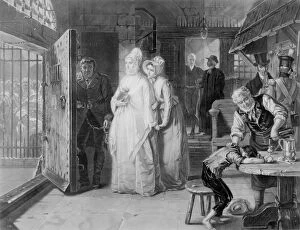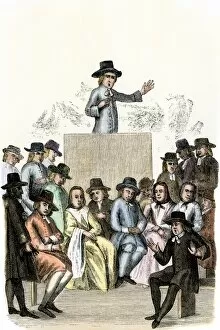Society Of Friends Collection (#2)
The Society of Friends, also known as Quakers, has a rich and diverse history that spans centuries
For sale as Licensed Images
Choose your image, Select your licence and Download the media
The Society of Friends, also known as Quakers, has a rich and diverse history that spans centuries. In the 1600s, this colonial family was banished from Puritan Massachusetts due to their unconventional beliefs and practices. Despite facing adversity, they remained steadfast in their commitment to equality and peace. One iconic image that captures the essence of Quakerism is that of Quaker women spinning in church. This act symbolized self-sufficiency and simplicity, values deeply ingrained within the Society of Friends. Their worship services held in Philadelphia during the 1800s were characterized by silent contemplation and communal reflection. The Old Elm tree stands tall as a testament to the enduring legacy of Quakers' graves engraved with their names nearby. It serves as a reminder of those who dedicated themselves to promoting social justice and humanitarian causes throughout history. During times of hardship such as c. 1861, the Society of Friends established soup kitchens for feeding the poor in Manchester. Their commitment to serving others exemplifies their belief in treating all individuals with dignity and compassion. Quaker Quality extends beyond philanthropic endeavors; it encompasses every aspect of life. Even cigar labels like "Quaker Quality" were adorned with chromolitho designs showcasing excellence associated with this esteemed community. Jordanes Meeting House in Buckinghamshire served as a gathering place for Quakers seeking spiritual solace amidst nature's beauty. The tranquil setting fostered introspection and deepened connections among members. In an engraving depicting The Quaker Deputation meeting Queen Victoria, we witness an important moment where these peaceful advocates engaged with political leaders to promote change on a larger scale. An old-time Quaker wedding lithograph portrays love rooted in simplicity yet filled with profound meaning—a union based on shared values rather than material extravagance. Historical encounters between influential figures like Cromwell and Fox shaped not only individual lives but also influenced societal norms through dialogue centered around principles dear to both parties.













